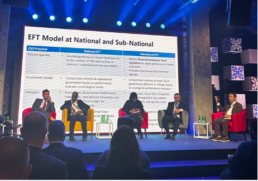Tallinn, Estonia – Publish What You Pay (PWYP) Indonesia, in collaboration with the Energy for Growth Initiative, Ghana, and the Ministry of Foreign Affairs, Estonia, had the opportunity to organize one of 30 thematic sessions in the 8th OGP Summit series in Tallinn, Estonia on September 7, 2023, entitled “A Just and Open Government for the Energy Transition.”

This thematic session discussed why the energy transition and achieving global energy needs must be supported by transparency, data availability, participation, accountability, co-creation, and good governance. The session, which around 115 participants from various countries attended, also provided a space for speakers and participants to share open and transparent government approaches to the energy transition by highlighting case studies and country experiences, identifying risks, and early learnings on how Open Government Partnership (OGP) processes can build social trust and broader participation relevant to the global community.
Present as speakers in the thematic session were Aly Zulficar Rahim, Program Manager of Global Partnership for Social Accountability (GPSA), The World Bank; Bohdan Serebrennikov, Program Manager of DiXi Group; Gritta Anindarini, Deputy Director of Indonesian Center for Environmental Law (ICEL) Indonesia; Ian Mwinga, Head of Secretariat of Extractive Industries Transparency Initiatives (EITI) Zambia; and R. Alam Surya Putra, Director of Environmental Governance Program, The Asia Foundation (TAF) and opened by Kadri Lepp, Director General Department of Connectivity & Climate Diplomacy, Ministry of Foreign Affairs of Estonia.

Aly Zulficar Rahim presented the concept of social accountability developed by GPSA, which aligns with OGP principles. How does green accountability contribute to accelerating the energy transition? How far is the role of the World Bank as one of the development institutions concerned with the energy transition at the global and regional?
Bohdan Serebrennikov explained the experience of compiling the energy transparency index, who and how to utilize the index, and how the findings and recommendations of the energy transparency index can support OGP implementation.

Gritta Anindarini conveyed lessons learned from the role of civil society organizations, especially ICEL, in the implementation of the Just Energy Transition Partnership (JETP) in Indonesia, including its contribution to developing and improving cross-sectoral solutions to improve energy security, especially in ensuring that the transition process is responsive to vulnerable and marginalized groups.
Meanwhile, Ian Mwinga shared lessons on implementing EITI in Zambia, especially the dangers/risks faced by countries with mineral resources that are used for energy transition and how to overcome them.
Alam Surya Putra shared implementation lessons learned while promoting Indonesia’s Ecological Fiscal Transfer (EFT) initiative. Starting from why EFT is needed and its implementation in the form of National Ecological Fiscal Transfer (TANE), Provincial Ecological Fiscal Transfer (TAPE), District Ecological Fiscal Transfer (TAKE), success achievements, implementation approaches through empowering civil society organizations (CSOs), building coalitions, and developing several policy improvement agendas in Indonesia.
Author: Aryanto Nugroho